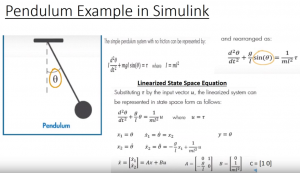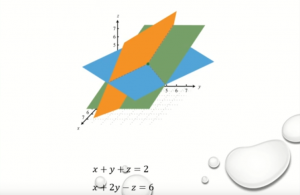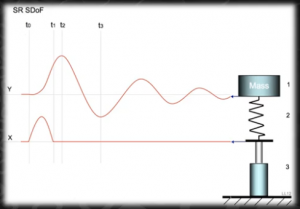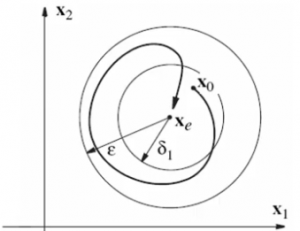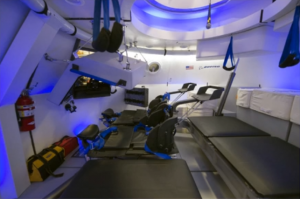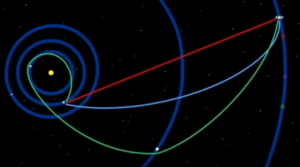News Career Publications Media Attention Software Education & Outreach Undergraduate Research

Acknowledgment: This material is based upon work supported by the National Science Foundation under Grant Number 1755780
Disclaimer: Any opinions, findings, and conclusions or recommendations expressed in this material are those of the author(s) and do not necessarily reflect the views of the National Science Foundation.
Project Overview
Smartwatch-like wearables have enabled seamless tracking of vital signs and physical activities, but still lack a significant feature: they are currently unable to provide any information about brain states or to modulate brain function for optimizing human health and performance. This project aims to make it possible for wearables to feature such capabilities. Being aware of brain states is not only extremely valuable in clinical studies but is also crucial to improving human performance in various everyday life activities. While recording neural signals directly from the scalp region is possible, it is impractical for use in everyday life. In order to fill this gap, the goal of this project is to pioneer a closed-loop brain-aware wearable architecture called MINDWATCH. This enables (1) decoding multidimensional brain states from noninvasive wearable devices and (2) applying corrective control. MINDWATCH will transform healthcare delivery (e.g., aging, autism, dementia) as well as human performance and productivity enhancement (e.g., online learning, smart workplaces). For instance, knowledge of mental health and cognitive engagement can enable detecting if a student is depressed or is not cognitively engaged/learning, which makes it possible to take corrective action early on.
This project seeks to overcome the barriers to achieving brain-aware wearables by pioneering a transformative system-theoretic computational toolset for noninvasive closed-loop wearable architectures that monitor and modulate brain function without needing neural recordings. The proposed framework will (1) infer discrete brain-related events in real-world settings, (2) decode multidimensional latent neurobehavioral states based on inferred brain activity, and (3) apply robust adaptive control to maintain the neurobehavioral states within desired ranges. The closed-loop framework will be rigorously validated using experiments on interactive human-technology environments and mental health.
News:
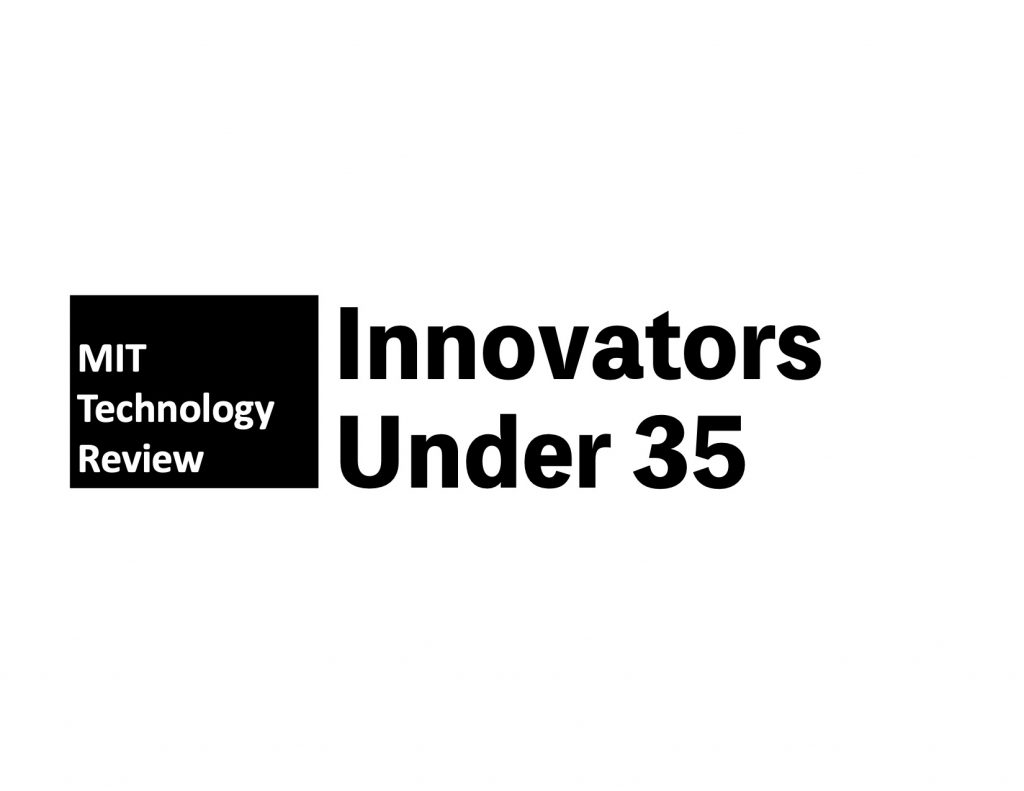
MIT Technology Review selected Rose as one of the visionaries in its list of Innovators Under 35 for the year 2020. The recognition highlighted her idea of sensor-laden wrist-watches that could monitor states of the brain traditionally accessed via neuroimaging technologies such as EEG. The idea would not only have clinical relevance for treating patients with neuropsychiatric or hormone disorders but would also have applicability to people who want to improve everyday health as well. Futuroprossimo, an Italian futurology magazine, also highlighted her as one of the three MIT Technology Review’s 2020 Innovators Under 35 female awardees, who work on an innovation that has the highest potential for a future Nobel prize. Read more

Our lab reported in PLoS ONE that a person’s sympathetic arousal level could be continuously tracked by monitoring changes in skin conductance and heart rate. This mixed filter algorithm could be embedded within wearable devices for monitoring patients diagnosed with certain types of neuropsychiatric disorders. Read more

Rose presented CML’s research findings at several invited talks. Examples include the Medical Wearables Conference, University of Maryland IEEE Leadership Seminar, MIT Technology Review’s Conference on Emerging Technologies, MIT Neural Signal Processing Seminar, and University of Texas Health Science IoT and Aging in Place Workshop.

The Cullen College of Engineering recognized Rose’s contributions to research and teaching excellence in the 2019-2020 Faculty and Student Excellence Awards. She received a Teaching Excellence Award for outstanding teaching and service to students and a junior-level Faculty Research Excellence Award. Read more

IEEE Women in Engineering (WIE) Magazine recently highlighted Rose as a “Woman to Watch.” Her career from her student days to an assistant professor, her love for writing poetry, and some of her outreach activities were described in an article published in the IEEE Women in Engineering Magazine June issue. Moreover, aside from the IEEE WIE feature, Rose’s work was featured by the IEEEXplore in August. IEEE spotlighted her and drew attention to CML’s work on tracking brain states based on tiny variations in sweat secretions. Read more on the IEEE WIE Feature

Rose was selected for the 2020-2021 Interstellar Initiative, a program by the New York Academy of Science and the Japan Agency for Medical Research and Development. The program seeks to bring together promising young researchers from different countries to address major research challenges related to healthy longevity. Read more

Rose received the NSF CAREER Award for her proposal entitled “MINDWATCH: Multimodal Intelligent Noninvasive brain state Decoder for Wearable AdapTive Closed-loop arcHitectures.” She proposed using smartwatch-like devices to infer states within the brain that are typically inaccessible except via neurotechnologies such as electroencephalography (EEG). Instead, tiny variations in sweat secretions and changes in heart (pulse) rates can be used to infer some of this information, and eventually be used to provide closed-loop therapy for patient care. Read more
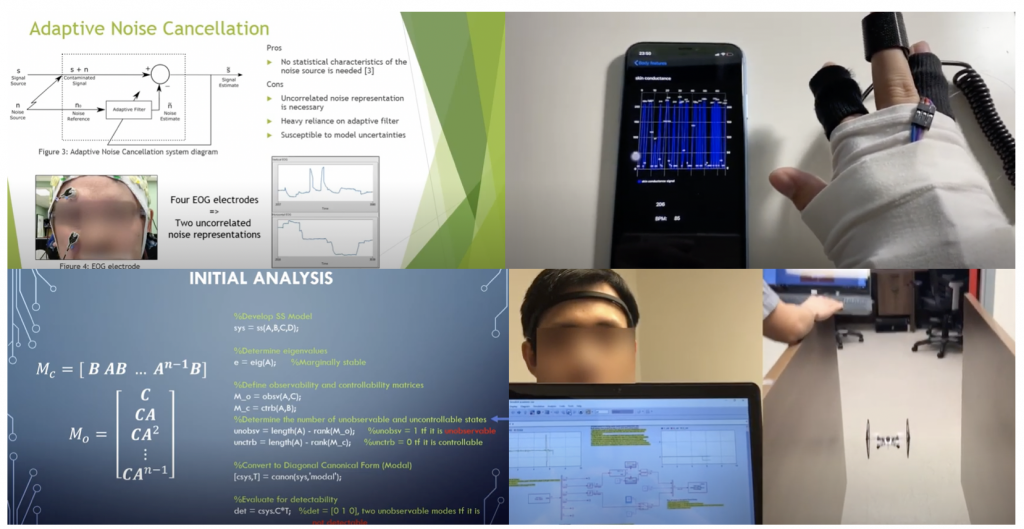
CML continued its public outreach virtually during the pandemic by posting videos onto its YouTube channel. The videos posted this year draw attention to senior design projects, class projects, and several others that are meant as brief tutorials for teaching concepts related to controls. The YouTube videos are part of CML’s broader effort of educating the general public about engineering.

Hamid Fekri has been selected for the UH Cullen College of Engineering Future Faculty Program. The program is intended to prepare top-performing Ph.D. students for a successful career in academia
Jon Genty received a Summer Undergraduate Research Fellowship (SURF) for his summer research at CML. Jon’s work involves analyzing growth hormone and skin conductance data to investigate applications to disease diagnosis.
CML graduate students presented posters at two conferences organized by Rice University: the Theoretical and Computational Neuroscience Conference, and the Ken Kennedy Institute Data Science Virtual Conference. The posters featured some of CML’s latest work on sparse deconvolution, estimation, and control with regard to recovering unobserved brain states from peripheral physiological signals.
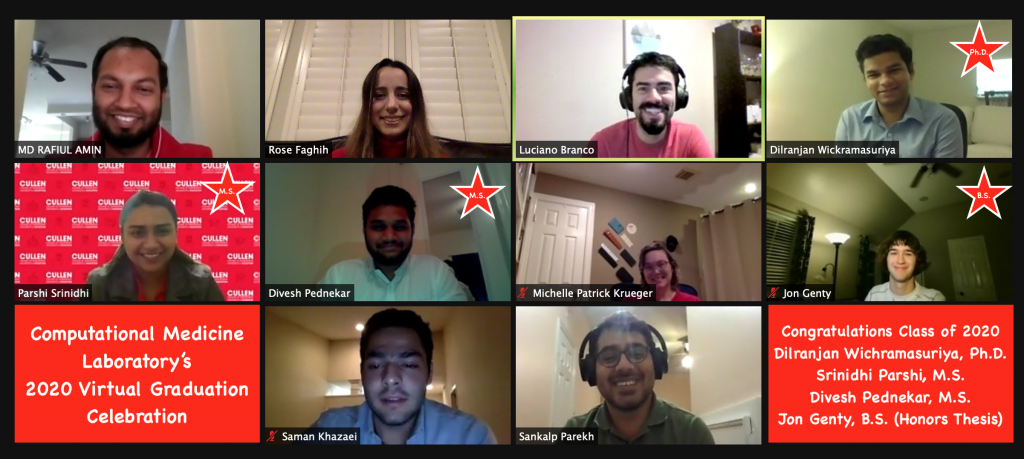
Four CML students graduated in 2020. Dilranjan Wickramasuriya successfully defended his PhD thesis in December 2020 as the first PhD graduate of CML. Srinidhi Parshi and Divesh Pednekar successfully defended their M.S. theses in May 2020 as the first two M.S. graduates of CML. Jon Genty successfully defended his undergraduate Honors thesis in November 2020.
MINDWATCH Publications (14 Publications)
Journal Papers [9 (9 published/accepted)],
Full-Length Conference Papers [4 (4 published/accepted)],
E- Books [1].
E-Books:
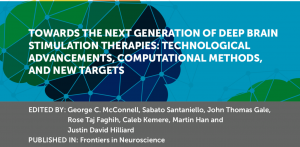
McConnell, G.C., Santaniello, S., Gale, J.T., Faghih, R.T., Kemere, C., Han, M., Hilliard, J.D.,“Towards the Next Generation of Deep Brain Stimulation Therapies: Technological Advancements, Computational Methods, and New Targets“, Frontiers in Neuroscience, 2021.
Journal Articles:
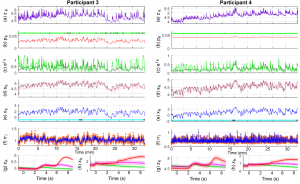
Wickramasuriya, D.S., and Faghih R.T., “A Mixed Filter Algorithm for Sympathetic Arousal Tracking from Skin Conductance and Heart Rate Measurements in Pavlovian Fear Conditioning,” PLOS ONE, 2020.
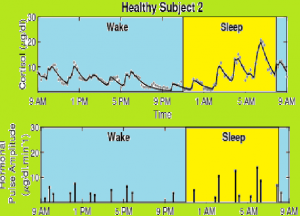
Pednekar D, Amin M.R., Fekri Azgomi H, Aschbacher K, J. Crofford L, and Faghih R.T., “Characterization of Cortisol Dysregulation in Fibromyalgia and Chronic Fatigue Syndromes: A State-Space Approach” IEEE Transactions on Biomedical Engineering, 2020. (supplementary info)
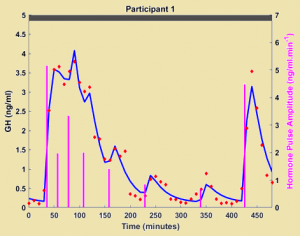
Genty J. X., Amin M.R., Shaw N. D., Klerman E. B., and Faghih R.T., “Sparse Deconvolution of Pulsatile Growth Hormone Secretion in Children,” IEEE/ACM Transactions on Computational Biology and Bioinformatics, 2021. (Supplementary Info)
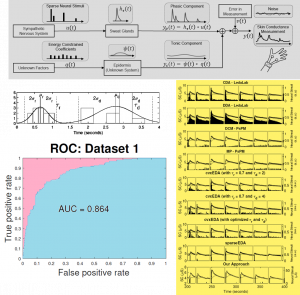
Amin, M.R. and Faghih, R.T., 2020. “Identification of Sympathetic Nervous System Activation from Skin Conductance: A Sparse Decomposition Approach with Physiological Priors“. IEEE Transactions on Biomedical Engineering, 2020. (Supplementary Info)
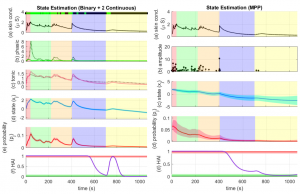
Wickramasuriya D.S., and Faghih R.T., “A Marked Point Process Filtering Approach for Tracking Sympathetic Arousal from Skin Conductance” IEEE Access, 2020.
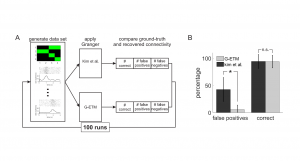
Casile A, Faghih R.T., Brown E. N., “Robust point-process Granger causality analysis in presence of exogenous temporal modulations and trial-by-trial variability in spike trains,” PLoS computational biology, 2021.
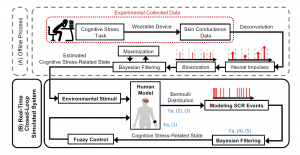
Fekri Azgomi H, Cajgas I, and Faghih R.T., “Closed-Loop Cognitive Stress Regulation Using Fuzzy Control in Wearable-Machine Interface Architectures,” IEEE Access, 2021.
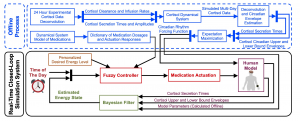
Fekri Azgomi H, Hahn J-O, and Faghih R.T., “Closed-Loop Fuzzy Energy Regulation in Patients With Hypercortisolism via Inhibitory and Excitatory Intermittent Actuation,” Frontiers in Neuroscience, 2021. (Supplementary Info)
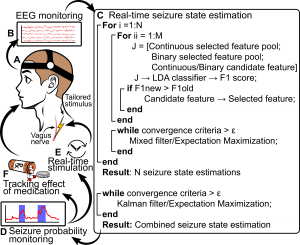
Steel A. G, Parekh S, Fekri Azgomi H, Badri Ahmadi M, Craik A, Pati S, Francis J. T.Contreras-Vidal J.L., and Faghih R.T., “A Mixed Filtering Approach for Real-Time Seizure State Tracking Using Multi-Channel Electroencephalography Data” IEEE Transactions on Neural Systems and Rehabilitation Engineering 2021. (Supplementary Info)
Conference Proceedings:
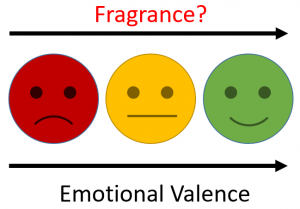
Seet M. S., Amin M. R., Abbasi N. I., Hamano J., Bezerianos A., Faghih R.T. , Thakor N. V., Dragomir A., “Olfactory-induced Positive Affect and Autonomous Response as a Function of Hedonic and Intensity Attributes of Fragrances,” The Annual International Conference of the IEEE Engineering in Medicine and Biology Society, 2020.
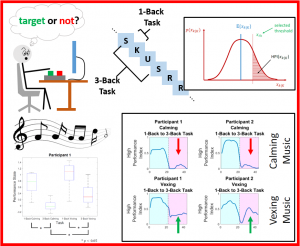
Amin, M.R, Tahir, M., and Faghih, R.T.,”An Investigation of music impacts on cognitive Performance and Arousal in the presence of Yerkes-Dodson Law.” The Annual International Conference of the IEEE Engineering in Medicine and Biology Society, 2021. (Accepted)
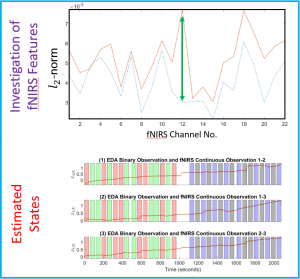
Yaghmour, A., Amin, M.R, and Faghih, R.T., “Decoding a Music-Modulated Cognitive Arousal State using Electrodermal Activity and Functional Near-infrared Spectroscopy Measurements.” The Annual International Conference of the IEEE Engineering in Medicine and Biology Society, 2021. (Accepted)
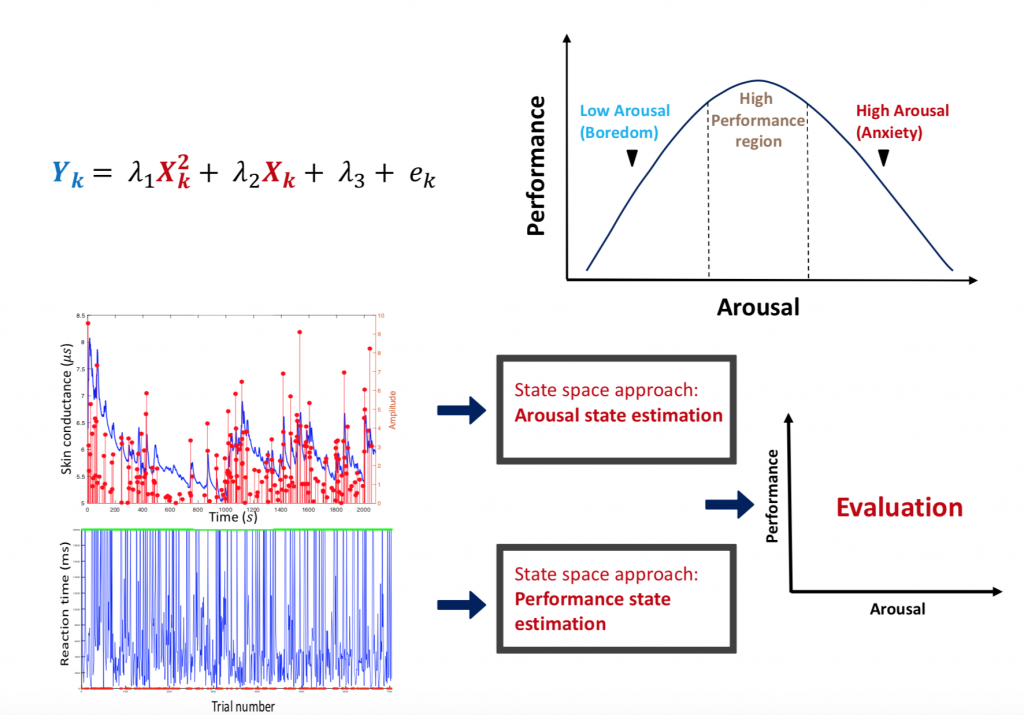
Khazaei, S., Amin, M.R, and Faghih, R.T., “Decoding a Neurofeedback-Modulated Cognitive Arousal State to Investigate Performance Regulation by the Yerkes-Dodson Law.” The Annual International Conference of the IEEE Engineering in Medicine and Biology Society, 2021. (Accepted)
Selected Media Attention
Paper from CML outlines new Approach for Management of Cushing’s disease
New Smartwatch Technology Uses Sweat on Skin to Infer Brain Stress
ECE students Fekri Azgomi, Amin among 21 students presenting at national meeting
Faghih tabbed for 2020-21 Interstellar Initiative
Computational Medicine Lab’s Research Featured by IEEE Xplore
UH’s Faghih Named an MIT Technology Review 2020 Innovator Under 35
College honors 17 with yearly Faculty and Student Excellence Awards
Faghih featured in IEEE publication as ‘Woman to Watch’
Continuously Tracking Fear Response Could Improve Mental Health Treatment
Students provide videos to public modeling spread of COVID-19
Adapting Smartwatches to Improve Distance Learning and Health
Provisional Patent
R. T. Faghih., Wickramasuriya, D.S., . SYSTEMS AND METHODS FOR ESTIMATING A NERVOUS SYSTEM STATE BASED ON MEASUREMENT OF A PHYSIOLOGICAL CONDITION U.S. Provisional Patent Application No.: 63/110,48
Software
Emotion Recognition from Heartbeat Dynamics
Educational and Outreach Activities
Girls Engineering the Future Outreach Event (2021) – (Video Link)
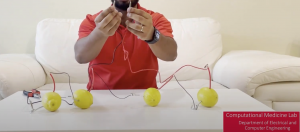
Educational Videos
State-Space Modeling and control of power systems – Video by Thejas Rajan (Spring 2020)

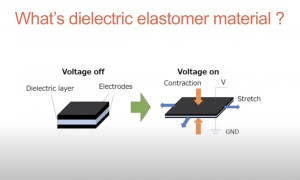
CartPloe LQR Control Analysis – Video by Pengyu (Ben) Yuan (Spring 2020)
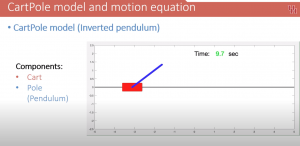
An Application of Optimal Control in EM – Video by Neil Jerome A. Egarguin (Summer 2020)
Matrix Algebra and Linear Equations – Video by Prasanna Kumar Reddy Gade (Fall 2018)
Video on Stability by Nitin Bhabsar (Fall 2018)
Gilbert Realization and Pole Zero Cancellation – Video by Divesh Pednekar
Reference Tracking and McMillan Degree – Video by Aruj Khandelwal
Web Outreach
Computational Medicine Lab’s Youtube Channel
K-12 and College Level Mentor on Engineer Girl, a website by the National Academy of Engineering.

